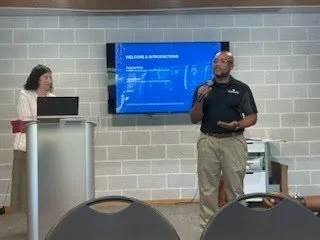Automation is pushing out the African-American and Latino working class. What’s next for them?
Sign Up For The Newsletter
〰️
Sign Up For The Newsletter 〰️
Photo by Andrea De Santis on
In 1964, during the Civil Rights Movement, “Why We Can’t Wait” by Martin Luther King Jr., was published. In it, King writes about the Southern Christian Leadership Conference’s nonviolent protests, the group’s theological and philosophical approach to protesting, racist white people, the organization's struggles to bring about racial equality in the North and South, and the plight of black America.
Among the many subjects covered, King tackles the topics of black unemployment, the lack thereof, and the effects of automation. Acquiring better-paying jobs was hard in a racial caste system during the 1960s. But what contributed to the difficulty of Black unemployment, King laments, was the implementation of machines in factories across America, which further reduced labor participation for Black workers along with their chances to move up the socioeconomic ladder.
“[Black people’s] economic problem was compounded by the emergence and growth of automation,” King wrote. “Since discrimination and lack of education confined him to unskilled and semi-skilled labor, the Negro was and remains the first to suffer in these days of great technological development.”
Though we live in somewhat different times, the worry that automation will cut and or limit African-Americans and Latinos’ jobs is a current fear for some scholars and economists.
In a 2017 study, Dr. Kristen Broady, an economist, writes that during the fourth industrial revolution African-Americans and Latinos are employed at positions where automation will replace them and/or alter their job entirely, meaning they would need to acquire different skills for a new job market.
According to the paper, published by the Joint Center Political and Economic Studies, a majority of African-Americans and Latinos are employed as “cashiers, cooks, combined foods preparation and [servers], which includes fast food, production, workers, and laborers and as freight/stock/ material movers.” In addition, they’re “over three times more likely to be employed by security firms (which can sometimes be considered a low-wage job, depending on geography) bus drivers and taxi drivers/ chauffeurs. Broady also adds the truck driving industry to this list.
In a similar, but different study, State Of Black Americans, published by the Urban League early this year, Broady wrote:
“A 2017 study by the McKinsey Global Institute estimates that automation could raise productivity growth globally by 0.8 to 1.4 percent annually, and also suggests that half of today’s work activities could be automated by 2055. While this is a promising projection for those focused solely on economic growth, it is a source of fear for Americans who are employed in fields most at risk of automation. Automation will affect Americans of all races, but it will have a significant impact on African-American and Latino workers.”
When automation is implemented, Broady wrote, it will provide new opportunities for sure, but could leave those who work in these specific jobs out of the job market.
We are seeing the early stages of what Broady wrote about in the 2017 and 2018 papers. As recently reported, Amazon Go has a goal to open 3000 cashier-less stores across the nation, phasing out and further reducing the cashier position.
A recent article in the Chicago Times detailed the customer experience for those shopping in cashier-less stores. “When customers enter, they scan a barcode from their Amazon Go app on their smartphone. From there, customers are tracked by computer vision on the ceiling that records whatever they take off the shelves. When they’re done, they walk out — no lines or payment necessary.”
In addition, The Verge reported that Sam’s Club will open Sam’s Club Now, a cashier-less store similar to Amazon Go, in Texas.
“Users will use a new Sam’s Club Now app to scan their items as they walk through the store, and there will be a final scan from a staff member as you exit to complete your purchase,” wrote Chaim Gartenberg.
This is not to mention the effect that automation may have on the trucking industry. The Wall Street Journal reported that self-driving trucks could potentially replace 294,000 jobs. Steve Viscelli, a fellow and a sociologist at the University of Pennsylvania, Robert A. Fox Leadership Program, and a senior fellow at its Kleinman Center for Energy Policy. Viscelli said drivers who move “cargo over hundreds of miles, but also perform few specialized non-driving tasks,” risk losing their jobs.
Since automation is inevitable, what are the consequences of unwisely implementing automation into society? Broady warns that “automation without strategic intervention will increase the skills gap, the wage gap, and increase economic inequality.”
“African-American communities will face unique challenges in labor transitions as a result of automation,” Broady wrote.
“Latinos have the highest automation potential at almost 60 percent of all jobs being impacted,” wrote Steven Wolfe Pereira, chief marketing and communications officer of Quantcast, at the Aspen Institute. “While new jobs will certainly be created with the rise of AI, they will most certainly require new digitally focused skills — skills that the majority of Latinos either don’t have today or will take time for them to learn in order to offset the impact of AI.”
A transitional period is when jobseekers are in the process of moving from one job to another. In order to do so, job seekers may be forced to acquire new job skills.
Broady wrote that this period will be extremely difficult for many reasons. It will be hard for some African-Americans and Latinos to transition in this market due to transportation challenges, limited social networks, lower rates of digital readiness, residential and educational segregation, and implicit bias, which could keep them out of the jobs market — even if they do obtain a new skill.
Researchers have found that implicit bias infects the software used to hire. CNBC reported that researchers at an MIT conference, March 2018, lamented the reality of algorithmic bias in software used to hire potential employees. Also, Reuters reported that Amazon ditched its AI system the company used to hire potential employees because it was biased toward women.
“…by 2015, the company realized its new system was not rating candidates for software developer jobs and other technical posts in a gender-neutral way,” according to the Reuters report. “That is because Amazon’s computer models were trained to vet applicants by observing patterns in resumes submitted to the company over a 10-year period. Most came from men, a reflection of male dominance across the tech industry.”
Education, re-educating, and training are what are needed to prepare workers for the new job market. Broady believes that Historical Black Colleges and collaborations with corporations can help to prepare African-Americans and Latinos for this new job market.
“One example is the collaboration between Kentucky State University and Toyota Motor Manufacturing, Kentucky Inc. to prepare students for jobs in the field of engineering,” Broady wrote in the State of Black America. “Another example is the partnership between Year Up Atlanta and Atlanta Metropolitan State College, where students can earn up to 21 college credits focusing on business and computer science during the first six months of the program, and then participate in a six-month internship at one of Year Up’s corporate partner firms.”
In addition to HBCUs helping Latino and Black students earn STEM degrees so that they may obtain an internship or apprenticeship or job permanence, these colleges could also assist students with becoming entrepreneurs. Andre Perry, David M. Rubenstein Fellow in the Metropolitan Policy Program at the Brookings Institution, wrote that “HBCUs can…provide room to incubate and accelerate business ideas among black entrepreneurs.”
Broady said if automation is done right, it could help to decrease long-standing inequalities. That remains to be seen.





Baltimore, Maryland -- While at the Maryland Lynching Memorial Project’s 8th annual conference, two of the Maryland Lynching Truth and Reconciliation Commission’s commissioners showed attendees, in the form of a slide show, a list of recommendations for a statewide policy to help remedy and repair communities injured by lynchings and racial discrimination.